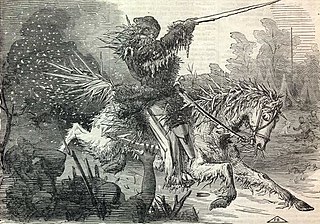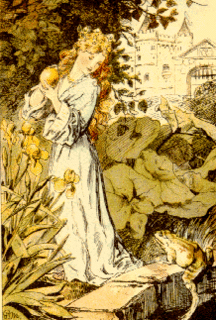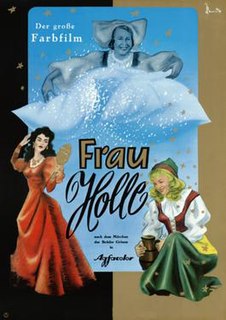Irene is a name derived from εἰρήνη (eirēnē), the Greek for "peace".

"Bluebeard" is a French folktale, the most famous surviving version of which was written by Charles Perrault and first published by Barbin in Paris in 1697 in Histoires ou contes du temps passé. The tale tells the story of a wealthy man in the habit of murdering his wives and the attempts of one wife to avoid the fate of her predecessors. "The White Dove", "The Robber Bridegroom" and "Fitcher's Bird" are tales similar to "Bluebeard". The notoriety of the tale is such that Merriam-Webster gives the word "Bluebeard" the definition of "a man who marries and kills one wife after another". The verb "bluebearding" has even appeared as a way to describe the crime of either killing a series of women, or seducing and abandoning a series of women.

Jack Frost is a personification of frost, ice, snow, sleet, winter, and freezing cold. He is a variant of Old Man Winter who is held responsible for frosty weather, nipping the fingers and toes in such weather, coloring the foliage in autumn, and leaving fern-like patterns on cold windows in winter.

Other than the many gods and goddesses of the Slavs, the ancient Slavs believed in and revered many supernatural beings that existed in nature. These supernatural beings in Slavic religion come in various forms, and the same name of any single being can be spelled or transliterated differently according to language and transliteration system.
Peer Gynt is a play by Henrik Ibsen named for its main character, based on the fairy tale Per Gynt.

"The Frog Prince; or, Iron Henry" is a German fairy tale collected by the Brothers Grimm and published in 1812 in Grimm's Fairy Tales. Traditionally, it is the first story in their folktale collection. The tale is classified as Aarne-Thompson type 440.

Die Frau ohne Schatten, Op. 65, is an opera in three acts by Richard Strauss with a libretto by his long-time collaborator, the poet Hugo von Hofmannsthal. It was written between 1911 and either 1915 or 1917. When it premiered at the Vienna State Opera on 10 October 1919, critics and audiences were unenthusiastic. Many cited problems with Hofmannsthal's complicated and heavily symbolic libretto. However, it is now a standard part of the operatic repertoire.
Cinderella is a classic fairy tale.
Lorelei is a rock in the Rhine River, the subject of numerous legends, poems, and songs.
Snow White is a popular fairy tale.

"Frau Holle" is a German fairy tale collected by the Brothers Grimm in Children's and Household Tales in 1812. It is of Aarne-Thompson type 480.
The common nightingale is a songbird found in Eurasia.
A witch is a practitioner of witchcraft.
Silent Woman may refer to:

Die schweigsame Frau, Op. 80, is a 1935 comic opera in three acts by Richard Strauss with libretto by Stefan Zweig after Ben Jonson's Epicoene, or the Silent Woman.
Bluebeard is the title character in a 1697 fairy tale by Charles Perrault.

Die ProSieben Märchenstunde is a television movie series that has been produced since 2006. It features characters that are exclusively portrayed by German and Austrian comedians and actors. The series is shot in Prague.
Crow is a bird of the genus Corvus, which includes jackdaws, ravens, and rooks.
Amazon most often refers to:

Mother Holly or Mother Hulda is a 1954 West German family film directed by Fritz Genschow and starring Renée Stobrawa, Rita-Maria Nowotny and Werner Stock. It is based on the fairy tale Mother Hulda by the Brothers Grimm, part of a series of adaptations directed by Genschow. It was made using Agfacolor.
This page is based on this
Wikipedia article Text is available under the
CC BY-SA 4.0 license; additional terms may apply.
Images, videos and audio are available under their respective licenses.








